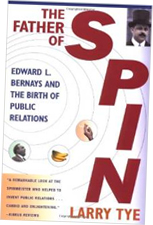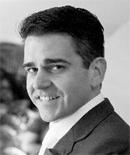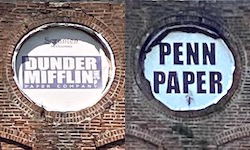Variety's editor Peter Bart has landed another haymaker on PR. It's one of several negative media items confronting the industry as PRSA gears up for its annual conference Oct 11-14 in D.C.
 Bart |
Bart wrote Sept. 30 that "It's hard to remember a moment when the business of PR looked more off balance, its practices more inept."
A previous Bart column on April 9, 2011 was headlined, "For Publicists, Evasion Overrules Promotion."
Today's publicists, he said, "seem to be locked in their bunkers doing damage control. Their clients want to hide, not hustle. They want protection, not promotion."
What got Bart started on his latest tirade was a story in the New York Times Sept. 14 by Christine Haughney on counselor Shelley Spector loaning her Museum of PR to Baruch College, 55 Lexington ave. at 24th st.
The collection includes 500 books, 100 hours of video interviews and 60 boxes of materials, about 20% of it on Edward Bernays, often called the "father of PR."
Spector "is determined to improve the image of her peers," wrote Haughney. A full-length biography of Bernays by Larry Tye is titled, The Father of Spin: Edward L. Bernays and the Birth of Public Relations.
Bad Time to Puff PR, Says Bart
 Bart thought this was "an epic display of bad timing" since he feels the industry is experiencing so many miscues including those of the National Football League on player domestic violence; Walmart firing PR head David Tovar; the Obama Administration's "inability to articulate it Mideast policy," and Warner Bros. firing 1,000 but saying it won't be noticeable because those laid off are outside the film and TV production orbit.
Bart thought this was "an epic display of bad timing" since he feels the industry is experiencing so many miscues including those of the National Football League on player domestic violence; Walmart firing PR head David Tovar; the Obama Administration's "inability to articulate it Mideast policy," and Warner Bros. firing 1,000 but saying it won't be noticeable because those laid off are outside the film and TV production orbit.
Bart's biggest beef against Bernays is that he helped to popularize smoking, especially among women. He positioned it as a "symbol of liberation" for them. Cigarettes were also portrayed as "torches of freedom" in ads.
Lawyers, Marketing Impact Current PR
Others finding problems with PR include Gene Weingarten of the Washington Post who has written at least three columns on PR people, one saying they are about as welcome at media as "mosquitoes at a hemophiliacs' picnic."
PR specialists, particularly at PR firms, are doing a land-office business these days getting out client messages on social media and also on traditional media even though the latter is shrinking and is less of an option.
Reporters encounter problems when negative issues crop up. Michael Schubert of Ruder Finn told PRSA's New York chapter Sept. 8 that lawyers have the final say over what goes into a release or what questions can be answered by PR. The marching orders for most corporate PR people--and agency people dealing with client matters--are not to deal with or help reporters--they already know too much.
Conference Hotel Emptied 1,500 Rooms
The Washington Marriott Wardman Park hotel, where PRSA will meet starting on Saturday, had a giant crisis Saturday, Aug. 30, when an arsonist set seven small fires in stairwells and elsewhere in three buildings, causing the hotel to order people from 1,500 rooms starting at 1 a.m.
 Indre |
They were allowed back in their rooms at 3 a.m. but another alarm was sounded and they were again chased into corridors, ballrooms and outside areas until 8 a.m.
Kenneth Benoit, professor of political science at the London School of Economics, who was staying at the hotel, took a picture of a burnt carpet in a hallway. He told the Washington Post that "The hotel had been evacuated and everyone was outside. Firetrucks arrived. We had no idea of what was happening."
There was "very poor communication" by hotel management on the middle-of-the-night uproar, wrote Election Law Blog reporter Rick Hasen who was on hand to cover the conference of the American Political Science Assn. Attending were 6,000 people in three separate hotels.
Hasen, chancellor's professor of law and political science, University of California at Irvine, named one of the 100 most infuential lawyers in the U.S. by the National Law Journal in 2013, praised police and fire departments and the cleaning and service staff but said the problem was "one of planning and management."
"The evacuation was difficult," he wrote. "We had to evacuate in part through areas with no lighting. There was virtually no communication from the hotel's management for hours as we were kept outside. Then we were given contradictory information. They were slow to react and did not seem to have good disaster planning in place. Unfortunately, having attended too many meetings of the APSA and the Assn. of American Law Schools at the hotel, this met my expectations of this hotel. Next time I'll stay at the excellent Omni Shoreham."
Marriotts Have No On-Premise PR
 Washington Marriott Wardman Park |
The expected 3,000 registrants at the PRSA conference starting on Saturday thus have a recent, real-live "crisis" they can sink their teeth into. Plenty of details are available on the web.
They won't find any PR person at the hotel to talk to. Manager Bill Walsh will be available but his time is limited. He has been helpful to us and is setting up a station in the hotel lobby where O'Dwyer products can be displayed since PRSA has refused to rent us space in the exhibit hall.
Mark Indre was quoted as a "hotel spokesman" by the Washington Post article on Aug. 30 written by Michael Ruane.
We were able to reach Indre, who is at a corporate site in D.C., by telephone on Saturday, Oct. 4, and had a brief conversation. He did not have time for a number of questions that we have including whether occupants of the hotel had at least one night deducted from their bills.
The hotel claims there were no injuries. Hasen said he knows of one person who went to the George Washington hospital emergency room for smoke inhalation.
Corporate PR Is Short-Changed
Ideally, and in years past, Marriott and other organizations would have a PR person with virtually unlimited time and attention for reporters and their questions. The PR people would not wait for us to contact them but had outreach programs that brought them people to the desks of reporters or created numerous other ways for interaction.
Reporters now often find that even if they are able to connect with a PR person at an organization, they are apt to run into resistance rather than cooperation.
David Carr of the New York Times wrote: "The modern chief executive lives behind a wall of communications operatives, many of whom ladle out slop meant to obscure rather than reveal."
Registrants at the conference starting on Saturday should grapple with what key editors are saying about the function.
They could bring up the subject with main session speakers Amy Robach, news anchor for ABC-TV's "Good Morning America," and Chuck Todd, moderator of NBC-TV's "Meet the Press." He was previously chief White House correspondent for NBC.
Other chief speakers are Walter Isaacson of the Aspen Institute, who has just authored The Innovators: How a Group of Hacks, Geniuses and Geeks Created the Digital Revolution; Mike Buckley of Facebook, and Michael Lomax of the United Negro College Fund.
PRSA needs to revisit its unlimited praise for Johnson & Johnson's handlng of the 1982 Tylenol murders which won a special Silver Anvil in 1982. The Anvil entry, describing J&J's handling of the murders, which has come under criticism in The Tylenol Mafia and other books by Scott Bartz, is still being sold for $7.99 and needs to be re-examined in the light of new evidence. Ethics panels of the PRSA's New York chapter and national in September both praised J&J, which rushed back into the market with easily-spiked capsules that were used for another murder in 1986.


 AB InBev has hired Donna Lorenson as chief communications officer and elevated the PR function to the senior leadership structure in the aftermath of the Bud Light marketing disaster.
AB InBev has hired Donna Lorenson as chief communications officer and elevated the PR function to the senior leadership structure in the aftermath of the Bud Light marketing disaster. Tunheim handled the Minnesota USA World Expo bid committee, which on June 21 congratulated Serbia for landing the 2027 event.
Tunheim handled the Minnesota USA World Expo bid committee, which on June 21 congratulated Serbia for landing the 2027 event. United Minds, management consultancy, has launched Myriant, a business resiliency offering to help clients deal with the challenges during this era of misinformation, polarization and geopolitical upheaval.
United Minds, management consultancy, has launched Myriant, a business resiliency offering to help clients deal with the challenges during this era of misinformation, polarization and geopolitical upheaval.  ImageShield, which guards against online image abuse, is looking for a communications pro to handle its PR and marketing campaigns.
ImageShield, which guards against online image abuse, is looking for a communications pro to handle its PR and marketing campaigns. Who knew that there is a real paper company, Pennsylvania Paper & Supply, inside the iconic building seen at the opening of every episode of “The Office?”
Who knew that there is a real paper company, Pennsylvania Paper & Supply, inside the iconic building seen at the opening of every episode of “The Office?” 


 Have a comment? Send it to
Have a comment? Send it to 
No comments have been submitted for this story yet.